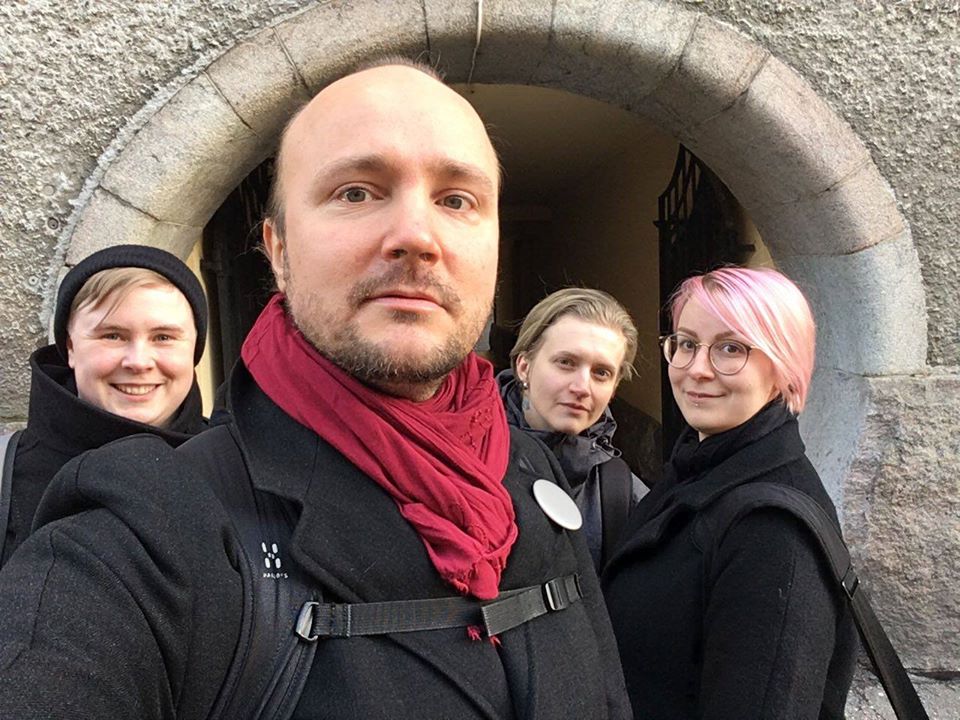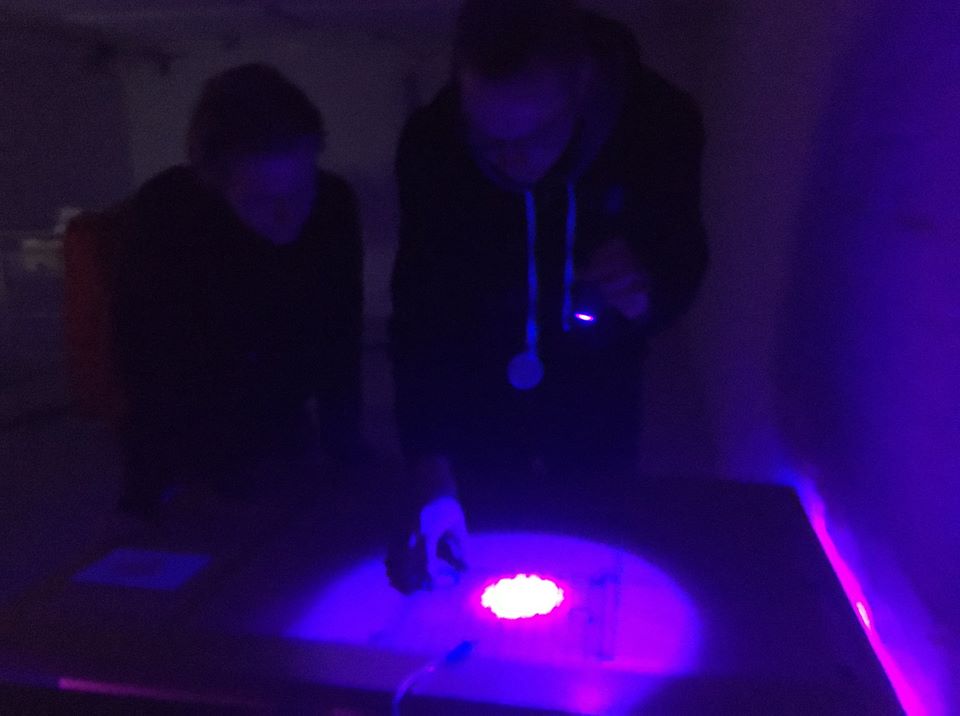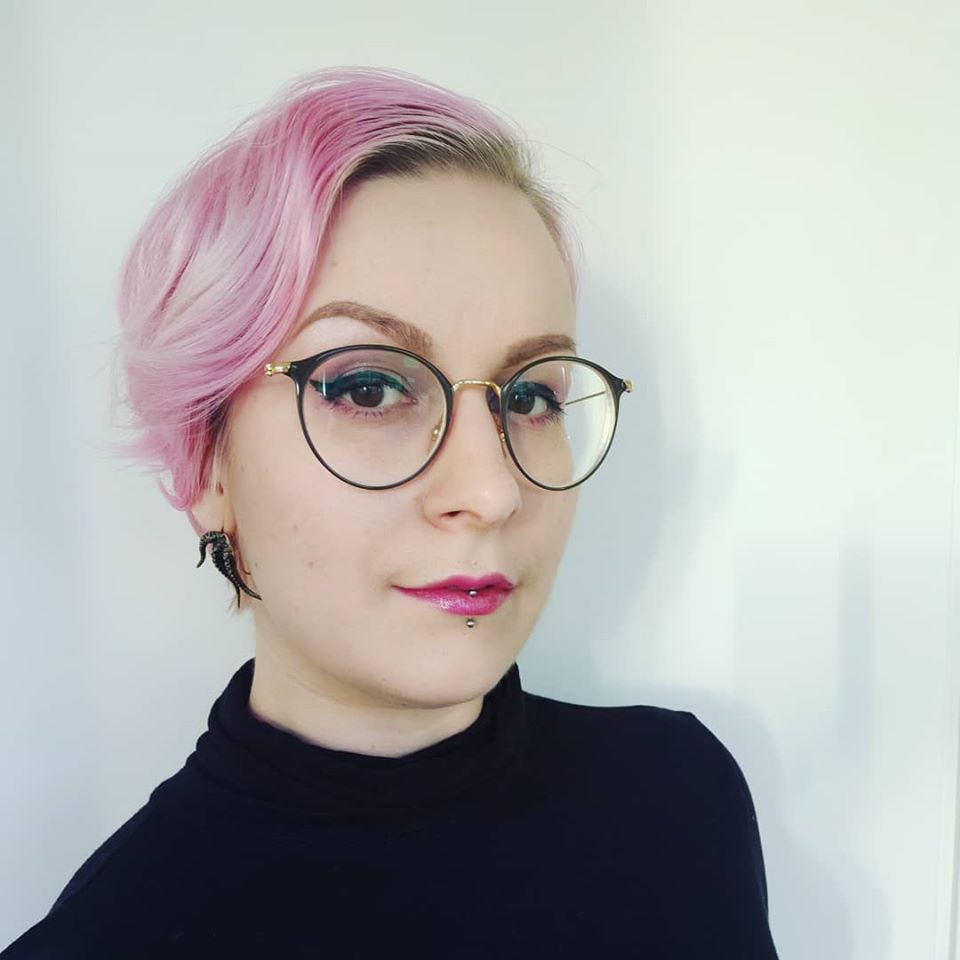‘Twas a Wednesday, the 11th of March 2020, as we met with a group of like-minded people with a shared goal – Bring to life a unique final event for Creathon. I split my time working for Creathon and my own company, Beyond Play (BP), which does some interesting combining of games, creative work and tech. BP was also supposed to contribute to the event, so it was a neat fit to work with both. We didn’t know that in a matter of days the event would be cancelled, all plans at Creathon revised, and our company would end up in a situation we couldn’t have imagined if we tried.
We’re a startup, currently still developing our first product. It’s still a secret for a bit, but I can reveal this much: we need a space for it, and we need to build stuff for that space and program some content. Originally we’d scheduled to build the pilot version mid April (right around this time), and had negotiated with Stadin Ammattiopisto, a vocational school, about building some of our interior. The space we had secured is located at a hotel in Helsinki.
On that Wednesday the clouds started to hang low over Helsinki. It was raining, but the greyness was also all over the news. COVID-19 had started to spread rapidly in Finland, and although no one said so out loud in the meeting, we all must have anticipated that something was happening.
Maybe it was foreboding of what was to come, but when I woke up coughing next morning, I stayed home. Usually a slight onset of flu wouldn’t have stopped me from going to work. One team member quarantined themselves due to suspected exposure to the virus in Helsinki. Another ones trip to a LARP in Poland got cut short, after the venue she’d travelled to was shut down due to confirmed COVID exposure. That same day the government started issuing restrictions one by one. The next day we were forced to cancel our event.
Slightly paralyzed by everything, I just followed things as they happened around me, like it was a slow motion action scene.
I had an incredibly restless weekend. I followed many of our friends on social media as they frantically arranged their flights back home from the venue in Poland. Some that had visited the location fell sick with, very likely, the virus. Every event I was supposed to attend this spring got canceled. It dawned on me, slowly, that schools probably would be closing very soon. Travel bans were issued, so hotels were likely to close too.
On Monday I held a feverish (remote) meeting to reorganize the work of nine people around a strategy that wasn’t a strategy. We were able to anticipate that we could neither have the build or the schedule we wanted. The production would become radically more expensive and would need to make compromises in every aspect. We weren’t able to tell anything more, and no rescue funds would be set up for another week.
Then after a day of no symptoms, I developed ones that fit the virus. We’ll never know what it was, but suddenly I ended up living inside four walls, sick, splitting time caring for a child. It took a couple of days to sink in. My biggest effort for Creathon was canceled. Our company’s entire strategy got flipped. I didn’t have the energy or opportunity to do much of anything, so I baked cookies with my daughter.

They need to help us
The Government was surprisingly quick in assessing the widespread damage the pandemic would inflict on the economy. Of course the actual extent is still unclear. Damage funds were set up at record speed, the Business Finland crisis fund among the first ones. I felt a wave of relief when I read the preconditions for applying. They seemed inclusive and broad enough to let even companies in the cultural field apply for it. The funds were targeted at exactly the things we’d need – an opportunity to assess and control damage, and create tools to combat the effects the pandemic had on our business.
After waiting for a couple of weeks to get a response, we were requested to send in additional information. In a nutshell, according to Business Finland being a new company in product development didn’t qualify us for funds. We’d need to prove in number that we are selling less because of the crisis than we did before.
The absurdity of this dawned slowly. There was no such precondition published when the fund opened. We had been very clear in our application: we were taking serious damage, not least because pre-marketing, piloting and sales would be postponed for an unknown time. We had everything set up towards a launch, which would’ve kickstarted our sales in late Summer. How do you not count that as a loss in sales?
While Business Finland had launched the fund very early, it had clearly been a hasty job. The fund was soon re-targeted towards companies of over 6 people, with smaller ones directed to apply for a similar fund from ELY. We took a look at the preconditions there, which now defined, that any company would have to be proven as being a profitable business after the crisis, to be eligible for funding. In practice this means any company still developing, and hence having the most difficult time to prove things, is probably deemed ineligible.
Bureaucrats working with the application would never have enough time to actually assess all companies fairly, and they would very very likely lack all relevant expertise to assess our case, which doesn’t fall under any category directly. Other companies in our situation let us know that knocking on Finnvera’s door in order to secure backing for a loan was also impossible. Developing companies were directed to a closed door, Finnvera didn’t process new customers for the time being.
Whatever hope of relief kept me going for the first weeks quickly ran out after this. The consolidation was, stupidly, that we weren’t alone, and other teams were being dwarfed by the massive crisis too.

One hand up in surrender, one down on the gear shift
It’s been tough to face the uncertainty and near finality the pandemic has caused. We’re lucky that we can look forward to continuing work at some point, hopefully, but until we have access to the space and understand more about the long-term developments, there’s next to nothing we can do.
Most of our team can’t be kept working for the time being. We need to have either new funding or a set building schedule. We do what we can until then.
Now our skeleton crew is working on setting up a Mesenaatti.me Korona Aid campaign to get pre-sales going and help us getting people back to work. This could help us gain traction for other aid funding as well, and we’re looking forward to going public with our plans.
We’re determined to keep going. We’ve always had a solid trust in our team and product, and we’ll keep that up even if there’s no knowing what will happen in the future. Determination, trust and work that we love are very important beacons in this time.
As an entrepreneur I’ve had to battle feelings of betrayal and worthlessness inflicted by the funding system, and a feeling of helplessness as a leader in a situation where it’s very hard to keep a clear direction. As a creative I’ve felt distracted and unmotivated to work, because it’s stressful not to know what you’re working towards.
As an individual I’ve had to learn how to listen to myself, the world and other people in a different way. Nothing is normal right now, and understanding that makes accepting realities a little easier, and the wounds we feel forming will be easier to heal.
In a situation like this it’s easy to feel like you’ve failed, while actually you’ve been robbed of a big part of your agency over things.
We need to remember, this wasn’t our fault.

Vera Schneider is a part time producer for Creathon, and CEO of the immersive game studio Beyond Play